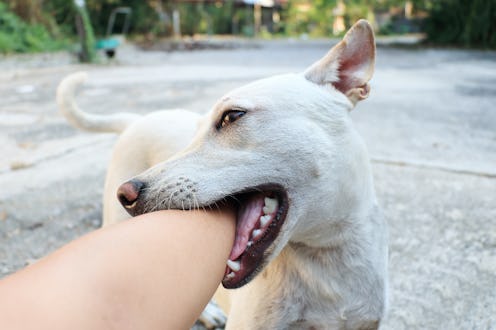
While it may not seem like a big deal if they playfully gnaw on your fingers or pull on your pant leg, it's still a good idea to teach your dog to stop biting. It's a habit that shouldn't be ignored, especially since it can get out of control. And if they're biting with reckless abandon, the sooner you can get them to stop, the better.
In terms of nipping, it's tough to say exactly why a dog would get carried away and use their teeth. Age can be a factor, as it's considered normal for puppies to be a bit "mouthy," Kayla Fratt, a certified dog behavior consultant at Journey Dog Training, tells Bustle. They don't know any better, and may chomp on your fingers, or bite at your ankles for fun.
They can grow out of it, but "ignoring puppy biting doesn’t guarantee it’ll go away as they age," Fratt says. "Older dogs (depending on breed, training, history, and personality) may also just be more likely to bite, mouth, or nip than others." Add in their moods and emotions, and a tired, cranky, or excited dog may also feel the need, Fratt says, which is why biting is often seen in newly adopted dogs, who are all sorts of overwhelmed.
Biting can be complex, and can come about for a variety of reasons, so it's important to be patient as you teach your dog how to behave differently. And in the meantime, rest assured it is something you can get them to stop doing, if you make an effort.
To start, let them know that biting hurts. To do so, the next time they nibble at you, "leave your hand where it is and say a clear 'ouch' (in a yelping voice) until your puppy stops biting," Danielle Mühlenberg, a professional dog trainer, tells Bustle. "Praise him for letting go and continue playing or petting." Consistency is key. Keep saying "ouch!" every time they bite, so they can catch on and realize this "playfulness" is hurting you.
From there, it may also be helpful to redirect their attention away from your fingers or ankles, and onto something else. "The goal of redirecting is teaching your puppy that mouthing on toys is OK but not on skin," Mühlenberg says. "You should also teach him that clothes are a no go. When he starts play biting, engage with him in a game of tug to redirect his attention onto the toy and not your hand."
Walking away can also help, as it shows your dog that biting doesn't result in a good time, or any positive attention from you. So if she touches you with her teeth, "get up and walk away," Richard Cross, canine behavioral expert and editor of The Dog Clinic, tells Bustle. "It can take many repetitions for this to sink in, so be consistent and patient."
Dogs of any age may be more likely to bite if they're all revved up, so keeping them calm is another way to break this habit. "When you’re playing with your pup and you can see he’s getting to the point of starting to nip, this is the time to end the play session," Nicole Ellis, a certified professional dog trainer and pet lifestyle expert with Rover, tells Bustle.
Instead of throwing a ball or running around, practice teaching them a "sit" or "down" command — all while focusing on being calm — so they can relax for a bit and think about something else. "As he starts to get quiet, tell him how good he’s being," Ellis says. "He’ll enjoy the praise. (If you think he needs more playtime, you can start another play session in ten minutes, then go through the calming process again.)"
With time, your dog will start to learn that biting isn't OK, and that it doesn't get them what they wants. Dogs can make this connection, and since they only want to make you happy, yours will hopefully catch on soon. If not, though, don't hesitate to call in a few experts. A dog trainer may be able to identify why your pup is biting or nipping, and offer a few specific tips for curbing their habit, and sparing your fingers.